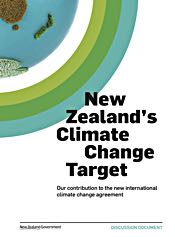 Climate change minister Tim Groser announced yesterday that the government is to consult on a post-2020 emissions target to present at the UNFCC conference in Paris in December. The consultation process is open to written submissions now, and there will be a series of public meetings and hui starting in Nelson on Wed May 13, finishing in Christchurch on May 20. Submissions close on June 3. In his press release, Groser said:
Climate change minister Tim Groser announced yesterday that the government is to consult on a post-2020 emissions target to present at the UNFCC conference in Paris in December. The consultation process is open to written submissions now, and there will be a series of public meetings and hui starting in Nelson on Wed May 13, finishing in Christchurch on May 20. Submissions close on June 3. In his press release, Groser said:
“New Zealand wants to set a target which is environmentally credible and reflects our particular circumstances. But we also need to consider the possible impacts and costs to our economy.”
Reasonable enough, but Groser then starts a pitch that sounds suspiciously as though he’s preparing the ground for an unambitious target:
“Increasing our commitment after 2020 will be a big challenge, as nearly half of New Zealand’s emissions come from agriculture and 80 per cent of our electricity already comes from renewable sources. The easy gains have already been made. But we are expected to make a fair contribution to combating this global problem.”
This impression is confirmed by a quick reading of the discussion document issued by the Ministry for the Environment to accompany the process. Much is made of the difficulties of cutting emissions, and the costs they will impose on the economy, but there is no apparent effort to quantify the risks of inaction, or the benefits to be delivered by the economic transformation to a low-carbon economy.
One of principal reasons that cutting emissions will be “challenging” is of course that Groser and his cabinet colleagues dismantled a comprehensive set of emissions policies inherited from the previous Labour-led government, mismanaged the emissions trading scheme so as to create a laughably low effective carbon price, stymied new forestry planting, and refused to bring agriculture into the ETS. It’s always harder to get somewhere if you’ve spent the last six years pedalling in the wrong direction.
I’ll be commenting further on the discussion document in due course, but as Brian Fallow in the Herald notes, I am not alone in finding Groser’s approach unpersuasive.
Being a cynic, I suspect that this whole rushed process is being offered as a fig leaf for a lack of ambition — about managing expectations downwards, rather genuinely seeking ideas with a view to creating good and effective policy. In the meantime, I urge Hot Topic‘s readers to prepare submissions, make an effort to attend one of the public meetings, and lobby the government for an ambitious set of emissions targets. We can but try…



You must be logged in to post a comment.